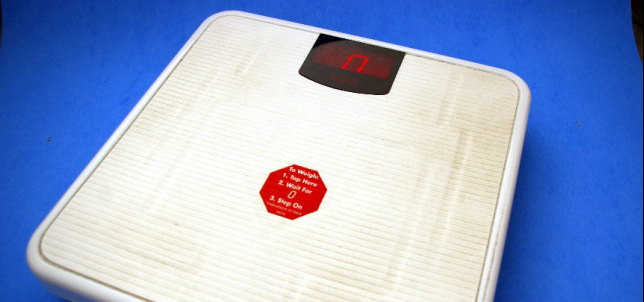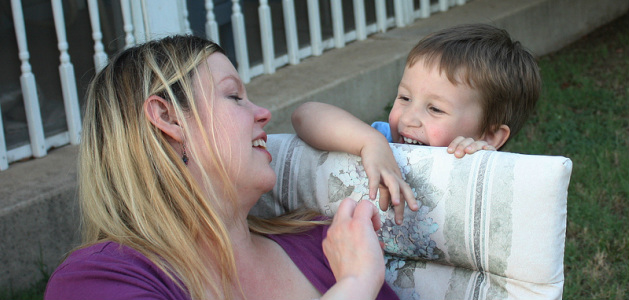 Instead of starting a sentence with that provocative word “no,” start a sentence with a word that gives you a chance to be heard—”yes.” Then follow up your yes by making your point in a positive way.
(Evonne Weinhaus and Karen Friedman. Stop Struggling with Your Child. Harper Collins Publishers. 1998) The yes method doesn’t mean you’re wishy-washy, and it doesn’t mean you always allow your child to get her way. Everyone wins with the yes method. If the yes method sounds like something you need to cultivate, then start practicing the “yes-but” reply. “Yes, you may play outdoors, but you must wear a heavy jacket and only stay out 45 minutes.” “Yes, you can read books during naptime, but first you need to finish your lunch.” “Yes, you may watch the video, but first you need to help me with the dishes.” …Parents say no to their children’s requests much more often than they say yes. Without thinking and for no good reason, the no just tumbles out! So for the creative parent, here’s a good rule to follow: If you don’t want your children pouting and nagging you into changing your mind, only say no when you are absolutely sure that you mean no and won’t under any circumstances change your mind. (Dr. Kay Kuzma. A Hug and a Kiss—And a Kick in the Pants!)
0 Comments
Keith Phillips When two of my grown children recently had their own first babies, it reconfirmed something I’d known for years: Parenthood brings out the best in people. New parents feel the impact immediately, both emotionally and physically—the love bond that happens at first sight and grows stronger by the day, and the interrupted sleep and other schedule and priority adjustments. But there are also subtler changes that others are usually the first to notice—that special glow that God reserves for new parents and the maturity that comes from stretching and sacrificing to meet their baby’s needs, for example. There was a time when I was sure that bringing home a new baby would be my proudest moment, and it was each time. Now I would say that comes in a close second to becoming a grandparent, because each time that happens (I have 11 grandchildren) I’m doubly proud—proud of my new grandchild and proud of their parents. So now that you know I’m a grandfather, you may wonder what grandfatherly advice I might have for young parents, so I’ll tell you. Besides the usual “big three”—love your children unconditionally, tell them often that you love them, and make quality time with them your top priority—I think one of the best things parents can do is to let their children be themselves. If you’re like most parents, you want your children to excel. It’s good to try to help them reach their full potential, but there is often a fine line between that and expecting too much of them or yourself. Neither you nor they are ever going to be perfect, so learn to celebrate the successes and not worry about the rest. Strive for love and trust rather than perfection, and you’ll form lifelong bonds that will keep you together through anything. Happy parenting! And for those doubly blessed, happy grandparenting! Article courtesy of Activated magazine. Used with permission. Linda Kavelin Popov with Dan Popov, Ph.D., and John Kavelin, book excerpt What kids are Like an acorn, which has within it the capacity to become a towering oak, a child has great potential. All children are born with all the virtues, the gifts within, waiting to grow. You may have noticed sometime or other a plant sprouting up through the concrete of a city street. The urge for growth is one of the strongest needs of any living thing. What a child becomes is a result of four things: nature, nurturance, opportunity, and effort.Nature is a child’s natural giftedness or virtues “profile.” Although each child has all the virtues within them in potential to one degree or another, the potential for the development of certain virtues is greater in a particular child, just as a rose has different attributes than a chrysanthemum. Nurturance is how a child is educated, how his gifts are recognized and supported, the difference between watering a plant and letting it wilt. The opportunities children have to act on their virtues give them the possibility to become who they are. A great musician of world-class creativity without an instrument may never learn of the special music she has within her. Effort is a child’s responsibility, his ability to respond to the opportunities to practice the virtues. Ultimately it is the choice of a child to act on her own potential. It is said that God provides nature and a parent provides nurture. The child himself must choose to respond to the opportunities in his life. Choice is at the core of moral will. We have such a short but critical time in which to have a fundamental impact on the development of the character of our children, which is the greatest asset for their happiness. Much of their character development is complete by the time they turn seven. What kids are not We are used to thinking of children as psychological beings who need good physical care and also affection, respect, and a healthy balance between dependence and independence. The idea of a parent as a spiritual educator builds on yet goes beyond the notion of the child as a psychological being. The book offers a frame of reference in which a child’s need for character education is primary. A parent, as spiritual mentor, focuses first of all on facilitating the child’s moral readiness. In order to make the shift from caretaker to educator, it is helpful to let go of notions about children which are not true to their spiritual nature. Your child is not born a blank slate upon which you will write. There is no such thing as a generic baby. True, a child’s personality and character are not fully formed. But they are “in there.” Just as an oak is in an acorn—not a spruce or a palm but an oak—each child is born with a special bundle of potential. In that bundle are three things:
Spiritual parenting involves a focus on a child’s gifts and possibilities, a readiness to support them to develop all they can be—to give life their best effort. A child is not a prince(ss) which parents warp into a frog. This is a modern notion which implies that if we left them to their own devices, children would be pure, undefiled, whole, and perfect. It contends that we are the ones who mess them up and “dethrone” them. This is a half truth. Parents do have enormous influence on children and can shape the script a child carries through life. But it is also true that left to their own devices, children are likely to take the path of least resistance, resorting to survival instincts, the animal side of their nature as material/spiritual beings. It is easier to develop the lower side of their nature, which doesn’t require them to engage their will. So children very much need a guiding hand to lead them. They are not inherently “pure.” They have the potential for both goodness and for destructiveness. Every quality they possess, every virtue, can be directed or misdirected. That’s why your role is so vital to their success. There are many virtues that thrive only under conditions of challenge. How can one learn patience without having to wait? How would a child ever develop determination if life did not provide frustrations? How could we learn forgiveness without being hurt? If we don’t use our virtues, we lose them, just like muscle tone in the physical body. Protecting children from their challenges is running interference with the Creator. As moral champions, our children deserve more respect. Some of the best parents have children who make very bad choices or are born with a particularly difficult temperament. How you parent is your responsibility, how they turn out is a complex and mysterious process, with many influences other than yours. The opposititis trap We often unconsciously project onto our children the unmet needs we had as children. If something in our childhood caused us pain—usually a lack of love—we tend to go one of two ways. Either we unconsciously repeat our parents’ behavior with our own children, or we go to the opposite extreme. We are far more aware of wanting to correct the sins of our parents when they emerge in our behavior than to catch the more insidious habit of opposititis. For example, if our parents were very judgmental and made their affection conditional on our performance, we want to give unconditional love to our children. What that may look like, unfortunately, is giving them carte blanche acceptance no matter what they do, whether they are being rude or courteous, kind or cruel. In doing so, we are ignoring their true needs for mastery and meaning. If our parents tended to be too affectionate and sloppily sentimental, we may hold our children at arm’s length, giving them the respect and space we always craved. Meanwhile, they may be longing for more hugs. The problem is that either way we are “reacting” to our own story rather than truly seeing our children. Our parenting becomes dictated by our needs and experiences rather than what is going on for our children. Rather than consciously treating our children as they need to be treated, we are treating them as we wish we had been treated by our parents. The “chip off the old block” syndrome Seeing a child for who she is, a unique individual, calls for us to detach ourselves from any expectations we may have of what the basic nature or “virtues profile” a child of ours “should” have, especially in the service of our egos. If she seems to be a quiet child who likes to read and has only one or two friends, it is not our place to try to shape her personality into that of an outgoing socialite. If we happen to be shy and have some painful memories of social awkwardness, we may feel the need to push this gentle little soul in a direction that is not hers. Many people spend years feeling they are not enough no matter what they do. The disappointment of a parent is devastating to a child. When our children disappoint us—and they will—it is for one of several reasons. Some of these are:
Of course, we have a desire to pass on what we have learned to our children, but the truth is that they meet life with a fresh perspective. It is far more empowering to focus on the virtue of excellence or purposefulness and then to discover, with great curiosity and openness, how your child will uniquely express these virtues in his life. Excerpted from the book The Family Virtues Guide: Simple Ways to Bring Out the Best in Our Children and Ourselves. Wellspring International Educational Foundation, 1997.
Do you want to channel your child’s unbounded energy and curiosity into positive and rewarding learning experiences? Keys to Toddlers and Preschoolers is a parenting guide with scores of fun, practical learning activities and suggestions to keep your ever on-the-go little one occupied for hours. More importantly, learn how to prepare
your child for life’s challenges and changes, and lay a foundation of faith that will guide and support him or her all through life. By Kathryn Westcott, BBC News Magazine The self-consciousness of a pre-teen is something many parents are only too aware of and the dreaded question of "Am I too fat?" can leave many lost for words. Even a carefully phrased response can provoke prolonged silences or slammed doors. Fears that focusing attention on a child's size might make them overly self-conscious, cause them to obsess about their appearance, or even lead to an eating disorder may cause parents to shy away from the topic. There is no single strategy, but there are "common sense" ways to deal with such a touchy issue. First, you have to talk about it Some parents think that the less said the better but there is no barrier to talking about things with your child, says Andrew Hill, professor of medical psychology at the University of Leeds's institute of health sciences. "It's not easy," he says, "but if questions are raised, don't duck them. Be engaged. The key thing is the 'why'. I would want to know why this behaviour is suddenly occurring. Is it something the child has seen on TV, or has someone said something at school - maybe something subtle but hurtful. These concerns are often symptoms of other events - sort these out and the other behaviour will likely moderate itself." A child's weight concerns, he says, often fluctuate and can be temporary. Girls of a particular age - coming up to puberty - do compare themselves with others in the class, he says. The most rapid change for a girl's body is growth associated with puberty and there could be massive differences within a single class. Girls, on average, double the amount of body fat as they go through puberty. Boys' body composition changes, but in a different way: they tend to put on more muscle, he says. "When girls compare themselves, they are at different points of their physical development. Talking to them is a positive and reassuring way to deal with it. Let them know that in a few years' time, those physical differences would have reduced. The key is not to make them self-judgemental." Don't be alarmed A parent should not overreact if a child asks them whether they are fat, says Paul Gately, professor of exercise and obesity at Leeds Metropolitan University. "There are parents who are absolutely gobsmacked. It's the dreaded question that's come when they are not prepared. But their reaction might cause a child to think "what have I unleashed?" says Gately. Many parents, he says, will "stick their heads in the sand" or tell a child there isn't a problem. But, he says, if there is a problem, the child will get teased in school and end up mistrusting the parent. "The teasing and bullying of overweight children is endemic in our schools," he says. "If a child has mentioned it, the issue is not going to go away. Parents need to have an open-ended, conversations in which the children do the talking. The child needs to understand it from their perspective," he says. Be prepared With child obesity on the rise, parents who have concerns that their child might be overweight could prepare in advance for the conversation that will inevitably come, says Gately, who runs weight management services in partnerships with local authorities. "Parents will benefit because they won't be in a responsive situation," he says. Parents should modify their environment in advance to make it more healthy, so when the question comes up, they can say that the whole family has been living a healthier lifestyle, and this needs to be built on. Emphasise the entire family's eating and exercise habits and commit to change - but not dramatic ones, says Gately. Bringing up the weight issue Is it wrong to broach the issue if a child doesn't bring it up first? The difficulty, says Hill, is if a parent sees it as an issue and wants to raise it. "Judge it - if they don't want to talk about it, don't run the risk of it becoming a contentious issue. If concerns persist, talk to a teacher or [doctor]." Keep it casual A parent who feels the need to broach the subject could gently ask a child if they would feel more comfortable if they were in a healthier weight range, says psychologist and writer Amanda Hills. "If they say yes, then offer to help them by cooking more healthy food - but encourage their input as this puts them in control." The key is to guide and not try to control your child's eating habits, she says. "Many eating disorders involve the feeling of not being in control," says Hills. "Keep the issue of food casual. Treat it as if it's fuel for a car - don't say that some food is good or some is bad. If a parent does feel the need to point out that something is not the best choice, do it in a low-key way - don't obsess about it." The key is not letting food become a battleground. Deflect the issue "We are hearing of younger and younger children being conscious of their body image," says Mary George of charity Beat. "It's another bit of childhood that is disappearing." If a youngster brings it up, don't avoid it try but try to deflect it, says George. "Offer praise and encouragement in other areas - tell them they are kind, helpful, happy and generous - steer it away from body image." Don't make jokes Parents often don't realise that making a joke about a child's weight can affect them for life, says Hills. "A father, for example, should never call a daughter 'chubby'. A husband shouldn't say negative things about their wife's weight, and vice versa." Parents must be careful not to be critical of their own weight or that of others, says George. "Even really young children - four- or five-year-olds - will take this on board." Mum's not on a diet Research shows that a child is affected by their mother's self-image and the way she treats food, says psychologist and writer Amanda Hills. In the US, this has been referred to as "thinheritance". "It is absolutely crucial that mum should never say she is on a diet," says Andrew Hill, a body image and behavioural specialist. "All of the people I have dealt with for eating disorders had a mother - or a father - who demonstrated obsessive behaviour around food." If a mother feels like cutting down, do it in a low-key way, he suggests. "Say something like, 'Mummy's not going to have a big potato because she's finished growing.' But mum should never serve herself a separate meal." But Andrew Hill says depending on the situation, there might not be a problem with a parent being seen to be managing their weight. "If a parent is going to Weight Watchers, for example, why hide it - it usually means they are overweight and they are trying to manage it." The key is not to obsess about it, he says. Active learning If a child is concerned about their weight, parents need to create a situation in which children are "active learners", says Andrew Hill, in which they learn from their own mistakes. They need to build self-confidence and self-competence, and parents need to give them the opportunity to go out with their friends and exercise - rather than focusing on their weight, he says. Set the nutritional agenda Children consume about 60 to 70% of their food energy at home, so parents set the nutritional agenda, says Hill. "Older children have more and more liberty and financial power - the key is to get them through adolescence so that they are confident and can make choices about how they prioritise, because later on they will make choices based on their own perception." Article courtesy of http://www.bbc.co.uk/news/magazine-22795927
Remember the old adage, “Silence is golden”? As parents, we have a hard time with this notion. We believe that when a child makes a statement, he is implicitly asking for a response. And, of course, we oblige, thinking that communication with our child is important. But here’s a new notion for you: You don’t have to respond to every comment that comes out of your child’s mouth. Sometimes the most effective form of communication is keeping silent. There are times when it’s okay for your child to have the first, the last, and the only word. This is especially true for those times kids come up with “announcements” that sound remarkably like complaints, perhaps even remarks that unfairly blame you. Typically parents respond to these comments by suggesting, clarifying, or simply disagreeing. But these seemingly innocent comebacks have the potential to ignite a power struggle since they unwittingly challenge the kids to make their own point even more strongly. Instead of chiming in, simply listen. Show you’re paying attention, but don’t feel compelled to comment when it’s not necessary. Remember, silence is often a valuable communication skill. … Silence is [one] way to acknowledge your child’s problem without becoming part of it. You are not being hostile or rejecting; at the same time, you’re not setting yourself up to be the fall guy for your child’s anger. Believe it or not, most of the time kids say things to get them off their chests and they really don’t expect you to do anything. Remember those easy-to-forget, undervalued words “Oh,” “Hmm,” “Really”—those short lifesavers that keep you out of a fight. These overlooked words are just as versatile as they are short. You can use them in many ways. The secret is in your tone of voice and how you punctuate your line. You may want to punctuate it with a heavy period, meaning “That is the end of this discussion”; an exclamation mark, meaning “Your comment has made an impression on me”; or even a question mark, meaning “I really do want more information.” When you use the “silence is golden” and “keep it short and simple” skills, you can: — stop a battle before it begins. — acknowledge to your child that you’ve heard him. — keep yourself from becoming defensive. — avoid getting caught up in an issue that you have no intention of solving.--Evonne Weinhaus and Karen Friedman * The importance of developing our listening ability is directly affirmed by James, a man who knew Jesus intimately: “Let every man be quick to hear, slow to speak.” (James 1:19) The two terse commands contained in the beginning of this verse fit nicely together. When we take time to listen responsively—and avoid the error of answering with authoritative pronouncements—the messages given back to us by our children are far less likely to be obnoxiously defensive. This, in turn, reduces the tension and may well help us avoid angry exchanges.--Dr. Bob Pedrick * Hear from Me about your children. This is a gift I could bestow upon you to make your job of parenting easier. It is a gift certificate which never expires, has no cash limit, and is redeemable anywhere, at any time. I can show you the reasons your children are behaving the way they are, their motives, the root of the problem, and the solution. I can give you the words to say that will help and inspire them. I can point out the good things that you can commend them for, and show you what the weaknesses are that you need to work with them on next. I can comfort and encourage you when you are weary and discouraged, and give you patience and faith when you are in need.--Jesus, speaking in prophecy * Children will behave more responsibly and maturely if they are talked to with the same respect you would give an adult. If a child feels that you expect him to behave in a responsible way, then he’ll more than likely try to fulfill your expectations. We should try as much as possible to put ourselves in our children’s place and communicate with them in the way that we would like to be communicated with if we were them.--Maria Fontaine * How would you feel if someone who was [in a position of authority over you] got angry and screamed at you? You’d probably feel like shriveling up and blowing away. Add an audience, and you’d feel verbally tarred and feathered. Now, you might quickly do what that authority figure wanted you to do, but you’d despise that person for embarrassing you. Children aren’t that much different from grown-ups in this respect. They don’t like being belittled or demeaned, especially in front of an audience. It would be best if you could catch yourself before you got so upset that you felt like screaming. Here are some ideas: If your child isn’t paying attention the first or second time you speak, try lowering your voice instead of raising it. Go over to your child, look him in the eyes and whisper your message. Or you might want to go one step further and try the silent method. Just go and stand next to your child and don’t say anything until he or she turns and looks at you. When you have her full attention, make your request. Sometimes just placing your hand softly against the child’s back and waiting will get her attention. Once you have your child’s attention, make your request clearly and firmly. Then make sure you follow up so you are certain she is doing what you want. When you do this, you’ll find a significant increase in your child’s compliance without any harmful side effects. And, you’ll feel a whole lot better by having tempered your temper!--Dr. Kay Kuzma * Do you ever sit down with your child and talk for a few minutes only about his or her concerns? Finding a few minutes each day to do this will pay handsome dividends in building a relationship of loving trust with your child. What will you talk about? What is your child concerned about most? People who are good conversationalists will tell you that you can talk for hours with anyone of any age, at any intellectual level, adult or child, and hold them captivated. All you have to do is show a genuine interest in that person and ask questions that help you explore that interest. What does this person do? How does he do it? What does she like? Why? If you want people to show loving concern for your interests, think how much more your child wants you, as a parent, the most important person in the world to him, to show that loving concern for his interests. But exactly what should you say when you take those few precious moments to talk with your child? That depends on what your child has done. Did he just come home from school? Is it time to read her a bedtime story? Did he just break a favorite dish? Is she having a temper tantrum? Is he sassing you back about something? Did she just come through the door crying because some friends weren’t being kind to her? Start with the circumstance. That’s always a good starting point, because that is uppermost in the child’s mind at that time. Then go from there.--V. Gilbert Beers Courtesy of http://anchor.tfionline.com/post/hidden-art-communicating-children/. Photo by dadblunders/Flickr.com James Dobson Described below are the steps of a program devised by Dr. Malcolm Williamson and myself when we were both serving on the attending staff at Children’s Hospital of Los Angeles. The system is useful with boys and girls between four and eight years of age; it can be modified in accordance with the age and maturity of the youngster. a) [Your chart should list] responsibilities and behaviors which the parent may wish to instill. [The items on your list may] constitute a much greater degree of cooperation and effort than most five-year-old children can display on a daily basis, but the proper use of rewards can make it seem more like fun than work. Immediate reinforcement is the key; each evening, colored dots (preferably red) or stars should be placed by the behaviors that were done satisfactorily. If dots are not available, the squares can be colored with a felt-tip pen; however, the child should be allowed to chalk up his own successes. b) Two pennies [or the amount you agree on] should be granted for every behavior done properly in a given day; if more than three items are missed in one day, no pennies should be given. c) Since a child can earn a maximum of twenty-eight cents a day, the parent has an excellent opportunity to teach him how to manage his money. It is suggested that he be allowed to spend only sixty to eighty cents per week of these earnings. Special trips to the store or toy shop can be planned to provide a handy source of reinforcement. Of the remaining 1.16 to 1.36 (maximum), the child can be required to give twenty cents to some charitable recipient; he should then save about thirty cents per week. The balance can be accumulated for a long-range expenditure for something he wants or needs. d) The list of behaviors to be rewarded does not remain static. Once the child has gotten into the habit of hanging up his clothes, or feeding the puppy, or brushing his teeth, the parent should then substitute new responsibilities. A new chart should be made each month, and Junior can make suggestions for his revised chart. This system provides several side benefits, in addition to the main objective of teaching responsible behavior. Through its use, for example, the child learns to count. He is taught to give to worthy causes. He begins to understand the concept of saving. He learns to restrict and control his emotional impulses. And finally, he is taught the meaning of money and how to spend it wisely. The advantages to his parents are equally impressive. A father of four young children applied the technique and later told me that the noise level in his household had been reduced noticeably. Excerpted from The New Dare to Discipline, Dr. James Dobson, Tyndale House Publishers, Inc. 1996
Maria Fontaine Parents have one of the most important jobs in the world—and you’re worthy of much appreciation, honor, and commendation. Some of you may be tempted to allow other aspects of your busy lives to consume your time and take precedence over your parenting and the time you spend with your little ones. Or if you’re a full-time parent, you may feel that the ministries or work others do is more important than what you are doing. But I want to remind you that your sacrifices and labors of love that you perform for your precious children will be rewarded. Even if your family members or friends don’t always see the love you give, the time you invest, the heartaches you experience, the challenges you face, the battles you fight, and the persevering spirit you possess to overcome obstacles, Jesus does, and He’s going to reward you accordingly. Every difficulty will pale when compared with the glory and honor He’ll rain upon you for a job well done. Jesus says: I have bestowed a great honor on you. At times it may not seem like an honor but rather the opposite—a drudgery, a drain, full of heartaches and heartbreaks, thankless, difficult, and demanding. I know it can sometimes be all these things. But these times do not portray the real picture. In teaching, educating, raising, and caring for your children, your work is like a masterpiece of living art—not something that will be admired on pieces of canvas, or sculptures carved from stone, or inscribed on the walls of a great church. No, those works of art will pass away, but the work of teaching, raising, and caring for your children will live on in their lives. Your children are creations of My hand, made in My image, and you are the one I have chosen to raise them in My nurture and admonition. Your job ahead is a mountain that may seem high. There are many parallels you can draw from what those who climb mountains have experienced. In short, it’s their lifework. True mountaineers train all their lives for their trek to the top. They plan every step carefully—the amount of equipment they’ll need, the team they will travel with, the time of year they will travel, the food supply, etc. They plot their course. Then they begin their journey. But no matter how well they have planned, unexpected conditions and circumstances that arise can add to the challenge. Sometimes they find themselves in impossible situations and they risk their lives for the climb. The physical and spiritual challenges you parents face on your journey are comparable to those who scale mountains. But you have a definite advantage, the ultimate advantage, the advantage that ensures that you will reach your goal. You have Me as your guide. You have the power of My promises in My Word for any impossible situation you find yourself in. You are My mountaineer! * The world of tomorrow is what the mothers of today make it, according to the way they raise their children.—David Brandt Berg * Children are a big job, but with a big job comes a big reward. —David Brandt Berg * Children are a heritage from the Lord, offspring a reward from him. Like arrows in the hands of a warrior are children born in one’s youth. Blessed is the man whose quiver is full of them.--Psalm 127:3–5 Post courtesy of www.anchor.tfionline.com. Photo copyright (c) 123RF Stock Photos |
Categories
All
Archives
March 2024
LinksFree Children's Stories |







 RSS Feed
RSS Feed
